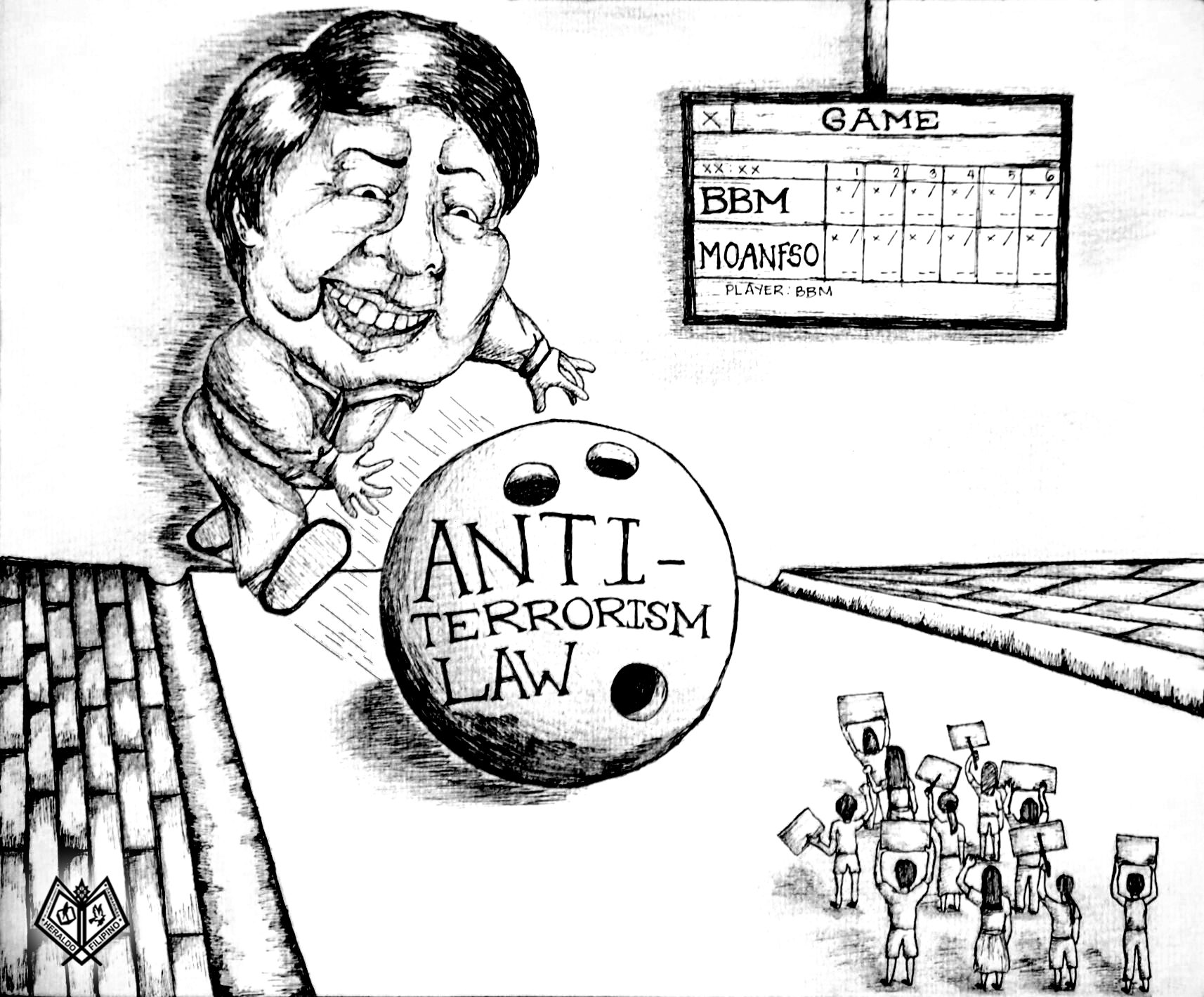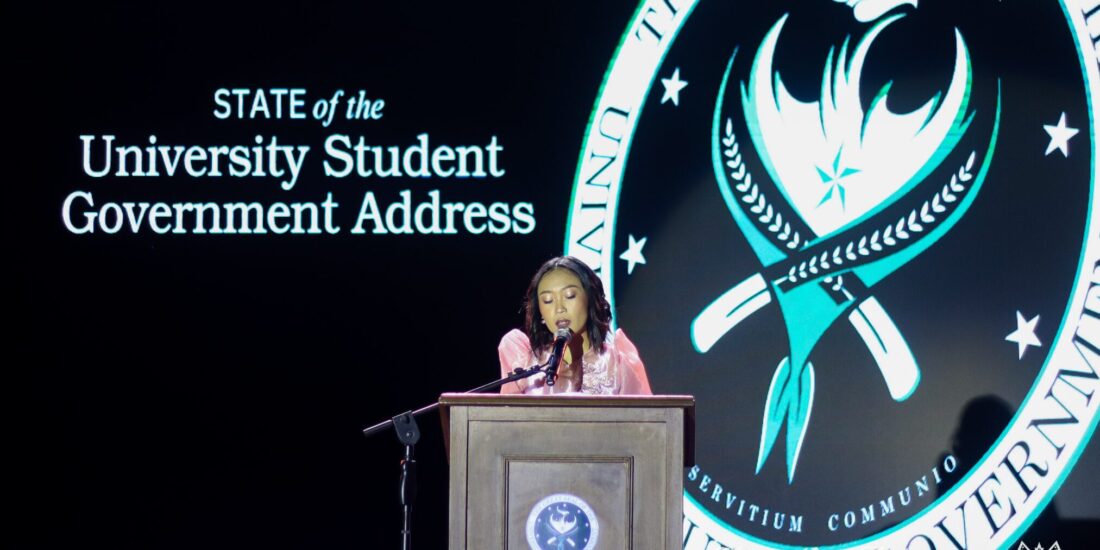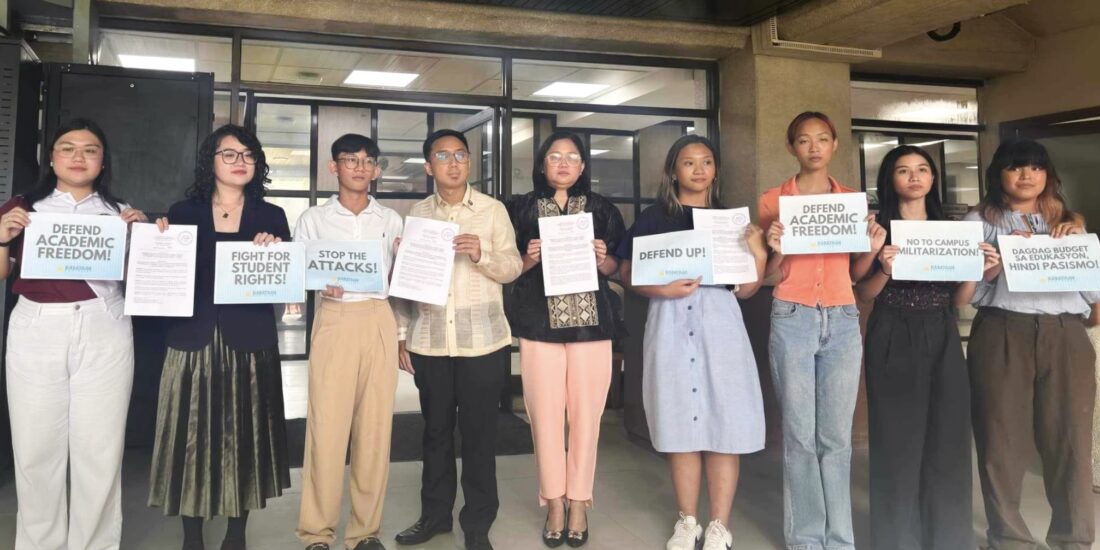Stricken pins of activism
Sparked by raising a banner that wrote “LASALLIANS OF CAVITE AGAINST CHA-CHA” during an EDSA Commemoration March organized by De La Salle University-Dasmarinas (DLSU-D) itself, Coalition of Concerned Lasallians (CCL) Coordinator Paolo Tarra was sanctioned with non-readmission by the Student Welfare and Formation Office (SWAFO) after apparently violating the Memorandum of Agreement Non-Fraternity/Sorority and Organizations (MOANFSO). He reportedly went against Section 19.2.3.3 of the Student Handbook, which prohibits persuading students to join unrecognized organizations. This follows a complaint filed by a College of Engineering, Architecture, and Technology (CEAT) alumnus on April 22.
The initial sanction was later rescinded and replaced with a year of academic probation. The University Discipline Board (UDB) deemed Tarra’s appeal creditable, citing insufficient evidence and procedural mishandling by SWAFO regarding the case.
Despite this, Tarra continues to face reprisals both in his supposed second home and, to an alarming extent, even in his own residence. In February, two individuals who claimed to be members of the National Task Force to End Local Communist Armed Conflict (NTF-ELCAC) went as far as intimidating his parents, seeking to obtain personal information and pressure them into signing documents. Although Tarra has condemned these actions, they have occurred repeatedly since then.
Although there is strong irony in the fact that the University-wide problem of repression gained controversy on a historical revolution’s commemoration march, there lies a bigger issue—extending far beyond the gates of Magdalo and Magtagumpay—that illustrates how universities are just the microcosms of a tyrannical state. In terms of power dynamics and status quo, this wrecking ball reaches the throats not only of activists but also of bystanders from each island of the Philippines.
Open illusion
The MOANFSO is designed to protect, or rather prevent, students from joining fraternities and sororities. It vaguely stipulates that unrecognized organizations are not to be joined and offered invitations to. However, there is a lack of definition as to what constitutes an “unrecognized organization” or specifications regarding which groups are acceptable. It is a fact that many students participate in off-campus unions, therefore there is a loose implementation of this policy. Interestingly enough, this MOA only gets conveniently brought up against a group composed of activists who advocate for systemic change—for a society free of injustice. For fear of overturning the power structure by progressive movements, oppressors take on the facade of protecting its scope to dispel a union of them.
During a workshop organized by CCL titled “Let a Thousand Paper Cranes Fly in DLSU-D” on the 75th International Human Rights Day last December 2023, students learned to make origami cranes and wrote callings to uphold human rights. During this, a number of security personnel from the University surveyed the attendees and took photos of them without permission, altogether causing fear among the students. Similarly, in May, security officials attempted to confiscate school identification cards (IDs) and photographed both media and participants of a protest held outside Magdalo Gate (Gate 1) in support of Tarra. It remains a question how the University saw reason to antagonize and disrupt a small group of students learning about folding papers and a modest protest advocating for human rights, all despite the events’ harmless nature.
The persistent mishandling of activists counters the progressive image the University strives to project. The mere acts of wearing black shirts on Martial Law Commemoration Day and displaying rainbow flags around the campus during Pride month do not signify true liberalism. Open-mindedness involves acceptance, but it remains a far-fetched idea for as long as the University fails in the mere notion of tolerance.
Flawed for convenience
Much like the MOANFSO, the nation also deals with a flawed transcript that claims it is for safety while often being twisted for convenience in eradicating truth-speakers. Republic Act (RA) No. 11479, known as the Anti-Terrorism Act of 2020, provides that it is “a policy of the State to protect life, liberty, and property from acts of terrorism.” However, its vague definition of the word grants the government excessive power in labeling taxpayers as terrorists, ultimately undermining human rights defenders, as noted by Amnesty International.
In Tarra’s case, he was threatened by the NTF-ELCAC under the guise of this law. The misuse of task forces is evident in the intimidation of his parents. It is alarming that the red-tagging of Tarra extends to harassment of his loved ones. For the people in power to stoop so low indicates just how distorted the law is and the extent to which they fear being held accountable.
In fact, NTF-ELCAC was the one who committed crimes by threatening, bordering on trespassing based on Revised Penal Code (RPC) Article 128, while also infringing the Tarra family’s basic human rights in accordance with Section 2, Article 3 of the Bill of Rights. Their intended warning is grave intimidation against Tarra, his honor and property, which also violates the RPC Article 282.
It is unfortunate that he, a regular citizen, has only what is written in the law to protect himself. In his efforts to do so, it seems as if there is a need to bend what is inked. Perhaps his rights are now too inconvenient to serve him—the cruel reality faced by many of our activists.
One for all
This singular case speaks for countless others. Even without the memorandum, speaking about social and political issues has been looked down upon as this is not a solitary incident. It is a shame how the University handled the situation, and much more how the people in higher power continue to do so. The issue extends beyond Tarra and SWAFO; it reflects a broader struggle between activism and the government. This singular ball, manipulated to silence, easily strikes the standing pins who try to stay still despite the obvious thirst to topple them over.
It is time to recognize that safety is meant to be for all, and that protesters only seek to amplify the unheard voices of the masses. Activists deserve to be protected much like everyone else. Tarra, like all, deserves to feel safe at his University and in his own home.
***
Student governments, program councils, and the entire student body must stand together in defending Paolo Tarra. In the words of Ditto Sarmiento, a student journalist from UP Diliman who became a prominent figure in activism—“kung hindi tayo, sino? Kung hindi ngayon, kailan?” Imagine the kind of system that would reign if fear of authority and bureaucracy takes over. The real people in power are those who stand together, in the same way that the capacity to change the system is within the Filipinos.
Regulations are only written in ink. Voices, on the other hand, can startle minds for as long as anyone is willing to speak. The suppression of opinion enables intolerance which upsets the hope of tomorrow.
Tarra’s case is a testament of the ruling class’s manipulation of the status quo, and only when the pins stand heavier than the ball can we overturn the game.





